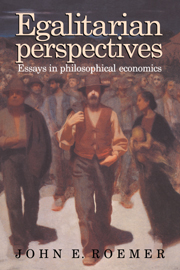Book contents
- Frontmatter
- Contents
- Acknowledgments
- List of sources
- Introduction
- Part I Exploitation
- Introduction to Part I
- 1 Exploitation, alternatives and socialism
- 2 Property relations vs. surplus value in Marxian exploitation
- 3 Should Marxists be interested in exploitation?
- 4 What is exploitation? Reply to Jeffrey Reiman
- 5 Second thoughts on property relations and exploitation
- Part II Equality of resources
- Part III Bargaining theory and justice
- Part IV Public ownership and socialism
- References
- Index
1 - Exploitation, alternatives and socialism
Published online by Cambridge University Press: 23 December 2009
- Frontmatter
- Contents
- Acknowledgments
- List of sources
- Introduction
- Part I Exploitation
- Introduction to Part I
- 1 Exploitation, alternatives and socialism
- 2 Property relations vs. surplus value in Marxian exploitation
- 3 Should Marxists be interested in exploitation?
- 4 What is exploitation? Reply to Jeffrey Reiman
- 5 Second thoughts on property relations and exploitation
- Part II Equality of resources
- Part III Bargaining theory and justice
- Part IV Public ownership and socialism
- References
- Index
Summary
How can one understand the formation of inequality, strata and classes, and perhaps exploitation, in socialist society? Among Marxists there is no widely accepted materialist theory of the development of classes and inequality under socialism. Perhaps more noticeably, there is no widely accepted theory of the political behaviour of socialist states. Indeed, the response of many or most Marxists to wars between socialist states, for example, is that at least one of the countries involved is not socialist. This argument is tautological and not scientific: since two socialist countries could never fight each other, therefore the major premise (that they are both socialist) must be false.
The example of wars between socialist countries is given to point out the nature of a crisis in Marxian theory: that theory, formulated in the late nineteenth century to explain the development of nineteenth century capitalism, does not seem useful when applied to late twentieth century socialism (and capitalism, perhaps). Marxists cannot, for instance, agree on the nature of Soviet society. Is it socialist, capitalist, state capitalist, or transitional? What definitions might one give to decide? Taking a cue from the Marxian approach to capitalism, one might seek to define a notion of exploitation relevant to socialist society. From such a beginning could follow a theory of class, and finally a political theory of socialist society as corollary to the theory of class.
- Type
- Chapter
- Information
- Egalitarian PerspectivesEssays in Philosophical Economics, pp. 15 - 36Publisher: Cambridge University PressPrint publication year: 1994
- 2
- Cited by



